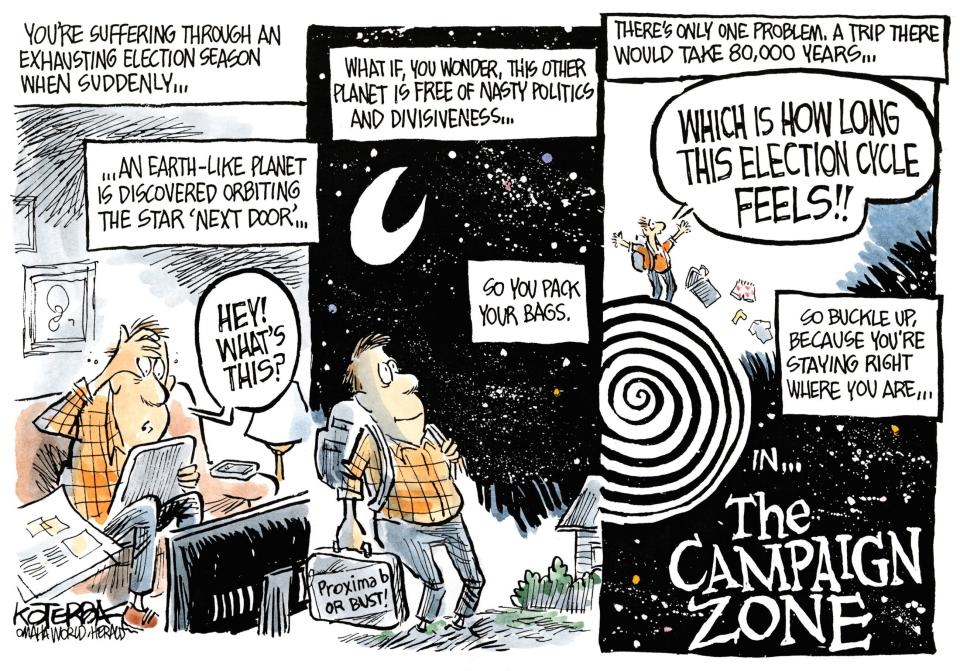6 of our top opinion pieces this week: ICYMI
In today's fast-paced news environment, it can be hard to keep up. For your weekend reading, we've started in-case-you-missed-it compilations of some of the week's top USA TODAY Opinion pieces. As always, thanks for reading, and for your feedback.
1. The Southern Poverty Law Center is a hate-based scam that nearly caused me to be murdered
By Jessica Prol Smith
"I’ll never forget the moment I learned we were on lockdown. It was Aug.15, 2012. ... A young man (was) on a mission to kill me and as many of my colleagues as possible. ... I wrote and edited for the Family Research Council, a public advocacy organization that promoted the principles I have cared about since childhood. ... It was the type of violent incident that one could expect a group that purportedly monitors 'hate,' like the Southern Poverty Law Center, to notice, research and decry. In fact, we were on the center’s radar but for all the wrong reasons. The assailant acknowledged later in FBI testimony that he had selected our office precisely because the SPLC had labeled my employer a 'hate group.' ... For years, former employees revealed, local journalists reported and commentators have lamented: The Southern Poverty Law Center is not what it claims to be. ... The SPLC is hollow, rotten and failing at the very virtues it pretends to celebrate. ... The center’s ugly slander and the gunman’s misguided attack have sharpened my resolve and deepened my faith in my Savior, who commands my destiny and shields me from the schemes of man. ... The SPLC, as an institution, has thoroughly disqualified itself as an arbiter of justice."

2. Why this Never Trump ex-Republican will vote for almost any 2020 Democratic nominee
By Tom Nichols
"All of the policy 'what about' hypotheticals from my conservative friends are diversions. They’re trying to move the argument to policy to blind us to the reality that President Donald Trump is both unstable and compromised. ... There is plenty of evidence that the president is compromised by our most dedicated enemy. Even before the Mueller report laid bare the degree to which the Trump campaign welcomed Russian help, it was obvious that Trump feared Russian President Vladimir Putin. ... This is why policy doesn’t matter. I have only two requirements from the Democratic nominee. First, he or she must not be obviously mentally unstable. Second, the nominee must not be in any way sympathetic — or worse, potentially beholden — to a hostile foreign power. ... It is a sign of how low we have fallen as a nation that 'rational' and 'not compromised by an enemy' are now my only two requirements for the office of the president of the United States. Perhaps years of peace and prosperity have made us forget the terrifying responsibilities that attend the presidency, including the stewardship of enough nuclear weapons to blow the Northern Hemisphere to smithereens. As long as the Democrats can provide someone who can pass these simple tests, their nominee has my vote."
3. Churches could win back teens like me if they were more welcoming and less judgmental
By Stacia Datskovska
"When I entered the musty church hall for Easter Mass and dipped my fingers in holy water, I noticed an approaching woman boasting a self-important demeanor. She promptly came up to my mom and started to shame her for wearing pants. ... I suddenly understood why so many of my friends were making promises to leave their respective denominations. Like I did that day at church, they likely felt alienated from attending a service that is supposed to instill hope. ... Church should offer more open-ended resources to teens — such as meditation, discussion groups and even nature walks. ... The Christian church experience needs to start transcending the traditional and adapting to the times. Only then can teens start finding meaning in church beyond traditional mass, and realizing they can come to God in their own way without indoctrination or an intermediary. Teen religious disillusionment is more prevalent than ever. Today’s teens are the first generation to be called 'post-Christian,' meaning they lack a sense of Christian identity. ... (And) 23% of nonattenders said a barrier to their faith remains the fact that Christians are hypocrites. ... When teens see churches adopting a welcoming presence, they might just take this as a sign to move beyond their own prejudices and explore spiritually."

4. The Trump-Greenland effect: Deplorable policies buried in an avalanche of absurd optics
By Jason Sattler
"The president of the United States pouting over his imaginary plan to buy Greenland — something that will never, ever happen, as Denmark's prime minister just made clear — is getting far more attention than how his policies are helping to melt the Danish territory’s ice at a worst-case-scenario rate scientists didn’t think would happen until 2070. ... All of this nonsense just keeps flowing through our brains as it’s sucked into our collective memory wormhole. Why? Blame 'the optics.' ... In optics world, amnesia must be feigned when Trump reads comforting words off a teleprompter that he’ll certainly contradict as soon as he finds the guy who carries his Twitter phone. We have to pretend there is some possibility he might pursue some gun safety legislation, though we’ve already been through the exact charade where he pretends to stand up to the National Rifle Association and then melts into a pond of self-tanner. ... Trump may understand the media's dependence on optics better than any person alive. ... To be fair, the news media lack a basic literacy to cover the Trump presidency because there was never supposed to be a president this good at manipulating them. Trump’s constant betrayals of decency and American values should be the only way to look at this deplorable presidency. But could you imagine the optics of that?"
5. Aaron Burr's lawyer owned my family. It has been a long, tragic journey from slavery.
By DeWayne Wickham
"I don’t know how long it was after August 1619, when the first enslaved Africans were brought ashore to Virginia, that my ancestors ended up in America. But I know my family’s journey from slavery to freedom was an arduous one. ... There has always been a fairly widespread belief among black Americans that by risking our lives in military service, we could secure for ourselves the (promise of) 'life, liberty and the pursuit of happiness.' ... In 1942, when my father shipped out for North Africa, the nation hadn’t really moved that far from its racist past. ... On Dec. 17, 1954, a week before Christmas, my father wrote a short letter about his failure to find money to buy holiday gifts for his five children. Then he took my mother’s life and killed himself. ... My family’s tragedy has been replayed in many ways over the past 400 years by too many black Americans. It is a tragedy born of enslavement, the dehumanization and hopelessness. ... While many black Americans have stood tall in resistance to centuries of degradation, some have been bent over by the withering effects of racial oppression. And a few, like my father, were broken. ... Despite all of this, when America went to war in Vietnam, I volunteered for military service and spent a year in Southeast Asia. ... I served so that my grandchildren won’t have to risk their lives for a pipe dream of racial equality."

6. California releases man from prison, begins rewind of overly harsh long-term sentences
By Hillary Blout
"Kent Williams expected to die in prison. In 2003, he was given 50 years to life for a series of property crimes that were driven by drug addiction. He had no expectation of release. But today, after 16 years of incarceration, he is free. Williams’ release, announced by the same district attorney’s office that originally sought the life sentence, is among the first under a new California law enacted this year that allows prosecutors to review prison sentences and determine whether those sentences are excessive, given an evolving understanding of what is meant by justice and public safety. ... California has the highest number of people serving long-term sentences in the country. ... About 2.3 million people are behind bars in this country. Who pays to house people we have locked up? ... Today, there is a growing consensus across the country that the old tough-on-crime policies are too costly and overly punitive, disproportionately impact people of color and have questionable public safety benefits. ... California's prosecutors must now take a hard look at whether the sentences sought by their office have been in the best interest of the communities they serve. Prosecutors across the country should do the same. "
You can read diverse opinions from our Board of Contributors and other writers on the Opinion front page, on Twitter @usatodayopinion and in our daily Opinion newsletter. To respond to a column, submit a comment to letters@usatoday.com.
This article originally appeared on USA TODAY: Southern Poverty Law Center, 1619 project, Greenland: Top columns

